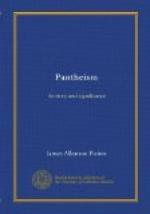[Sidenote: Genesis of Modern Religious Pantheism.]
Between this philosophical idea of a Oneness, not thought of as God, and the spiritual contemplation of a universal Life of which all things are modes, the highest thoughts of men hovered during the process by which, in some measure under extraneous influences, Greek speculation finally produced Neo-platonism—or, as we might say in the current phraseology of our time—a restatement of Plato’s teaching. Of this school, arising in the early Christian centuries, some leaders were undoubtedly Pantheists. But we cannot say this of Plato himself, nor of his master Socrates. For though these great men were more profoundly interested in the moral order of the world than in any questions of physical nature, or even of metaphysical subtleties, they were never given to the kind of contemplation suggested above in extracts from the Classical Books of the East, the contemplation which educes the moral ideal from unreserved subordination of self to the Universe as of the part to the Whole. Doubtless the inspiration imparted by Socrates to a disciple in mere intellect his superior, and the resulting moral and religious suggestions abounding in the Dialogues, did much to impel the current of religious evolution toward that spiritual aspect of the Infinite All which fascinated some of the Neo-Platonists, and received its most splendid exposition from Spinoza. But the conditions imposed by necessary brevity compel me to pass by those classic names with this acknowledgment, and to hasten toward the fuller revelation of Pantheism as a religion.
FOOTNOTES:
[Footnote 2: Some scholars think they can trace Christian, influences in the exceptionally late Bhagavad Gita, hereafter quoted. But it is a disputed point; and certainly in the case of the Vedas and pre-Christian literature arising out of them even Jewish influence was impossible.]
[Footnote 3: As imperious brevity excludes full explanation, I must content myself with a reference to The Religion of the Universe, pp. 152-5. London: Macmillan & Co.]
[Footnote 4: According to the late Max Mueller, with whom Prof. T.W. Rhys Davids agrees, the word Upanishad is equivalent to our word “sitting” or “session”; only that it is usually confined to a sitting of master and pupil.]
[Footnote 5: Sacred Books of the East, vol. i. p. 92. The immediately following quotations are from the same Upanishad.]




